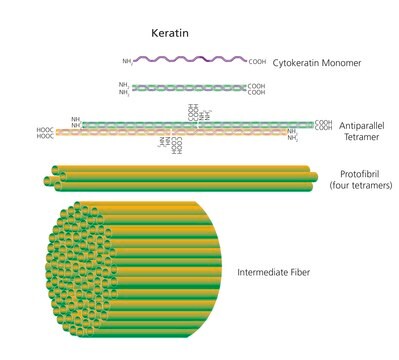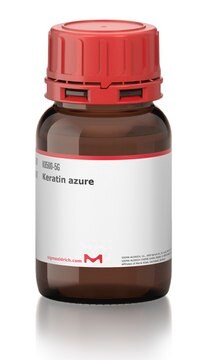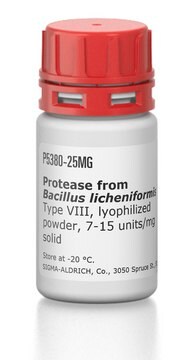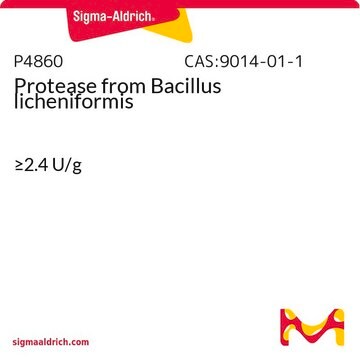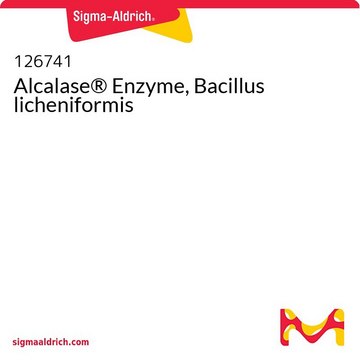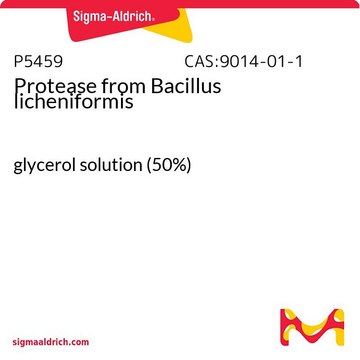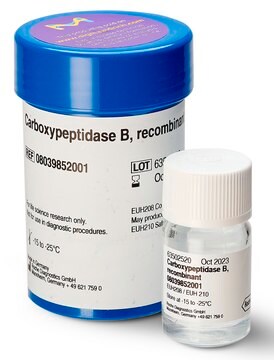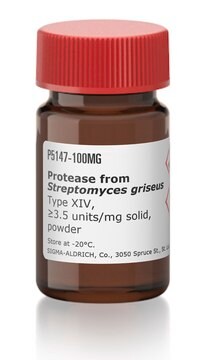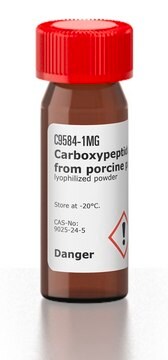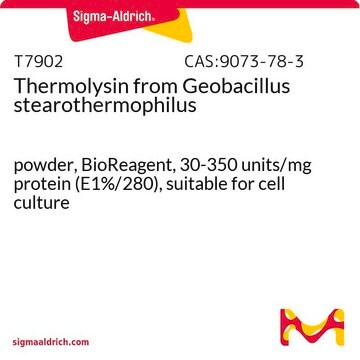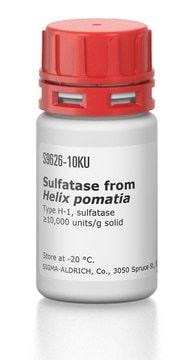K4519
Keratinase
lyophilized powder
Synonyme(s) :
Keratinase from Bacillus licheniformis, KerA, Keratinolytic protease
Se connecterpour consulter vos tarifs contractuels et ceux de votre entreprise/organisme
About This Item
Produits recommandés
Produit recombinant
expressed in E. coli BL21
Niveau de qualité
Forme
lyophilized powder
Activité spécifique
300-1000 units/mg protein
Poids mol.
~39 kDa
Plage de pH
5.5-12.5(optimum activity is seen at pH 12.5)
pl
8.73
Température de stockage
−20°C
Catégories apparentées
Description générale
Keratinase is a non-specific serine protease that cleaves non-terminal peptide bonds. This enzyme is active between 37°- 70°C. The highest activity is typically seen at 70°C.
Keratinase is also metalloprotease present in bacteria as well as eukaryotes. Keratinase isolated from Bacilus licheniformis culture is a monomeric enzyme.
Application
Keratinase may be used for enzymatic treatment of elementary body (EB), GAG molecules, and cells in the study of the role glycosaminoglycans (GAGs) in the invasion of host cells by Chlamydia pneumoniae strains.
Actions biochimiques/physiologiques
Keratinase is a particular class of extracellular proteolytic inducible enzyme with the capability of degrading insoluble keratin substrates. It is important for hydrolyzing hair, feather, and collagen in sewage system during waste water treatment. It is also useful in food industry, animal feed preparation etc. Insoluble feather keratin from poultry industry may be converted by enzymatic hydrolysis to glues, feedstuffs, fertilizers, films or used for the production of rare amino acids serine, cysteine and proline.
Propriétés physiques
Keratinase is activated by 0.10% SDS, 1.0% CTAB, and EDTA. Keratinase is partially inhibited by Tween®20, DMSO, isopropanol, methanol, and ethanol.
Définition de l'unité
One unit of enzyme is able to hydrolyze casein resulting in an absorbance value as the Folin-Ciocalteau reagent equivalent to 1 umole (181μg) of tyrosine per minute at pH 7.5 at 37 °C.
Notes préparatoires
The enzyme can be solubilized at 0.5-1.0 mg/mL in either sterile water or phosphate buffer. The best activity is seen with freshly prepared solutions. However, single-use aliquots of Keratinase solutions can be stored at -20° C.
Substrats
Keratin. Keratinases have also been used for the degradation of prion and prion-like proteins.
Autres remarques
This enzyme contains a C-terminus 6-Histidine tag.
Informations légales
TWEEN is a registered trademark of Croda International PLC
Mention d'avertissement
Warning
Mentions de danger
Conseils de prudence
Classification des risques
Acute Tox. 4 Oral - Eye Irrit. 2 - Skin Irrit. 2 - STOT SE 3
Organes cibles
Respiratory system
Code de la classe de stockage
11 - Combustible Solids
Classe de danger pour l'eau (WGK)
WGK 3
Faites votre choix parmi les versions les plus récentes :
Déjà en possession de ce produit ?
Retrouvez la documentation relative aux produits que vous avez récemment achetés dans la Bibliothèque de documents.
Les clients ont également consulté
X Lin et al.
Applied and environmental microbiology, 58(10), 3271-3275 (1992-10-01)
A keratinase was isolated from the culture medium of feather-degrading Bacillus licheniformis PWD-1 by use of an assay of the hydrolysis of azokeratin. Membrane ultrafiltration and carboxymethyl cellulose ion-exchange and Sephadex G-75 gel chromatographies were used to purify the enzyme.
Keratinolytic activity from the broth of a feather-degrading thermophillic Streptomyces thermoviolaceus strain SD8.
Chitte RR, Nalawade VK, Dey S.
Letters in Applied Microbiology, 28, 131-136 (1999)
Cheng-gang Cai et al.
Journal of Zhejiang University. Science. B, 9(1), 60-67 (2008-01-16)
A new feather-degrading bacterium was isolated from a local feather waste site and identified as Bacillus subtilis based on morphological, physiochemical, and phylogenetic characteristics. Screening for mutants with elevated keratinolytic activity using N-methyl-N'-nitro-N-nitrosoguanidine mutagenesis resulted in a mutant strain KD-N2
Ellen J Beswick et al.
The Journal of infectious diseases, 187(8), 1291-1300 (2003-04-16)
The role of glycosaminoglycans (GAGs) in the invasion of host cells by Chlamydia pneumoniae strains TW-183 and A-03 was investigated and compared with the role of invasion by C. trachomatis serovars L2 and E. The quantities of epithelial and endothelial
Bacterial Keratinases: Useful Enzymes for Bioprocessing Agroindustrial Wastes and Beyond.
Brandelli A
Food and Bioprocess Technology, 1(2), 105-116 (2008)
Notre équipe de scientifiques dispose d'une expérience dans tous les secteurs de la recherche, notamment en sciences de la vie, science des matériaux, synthèse chimique, chromatographie, analyse et dans de nombreux autres domaines..
Contacter notre Service technique